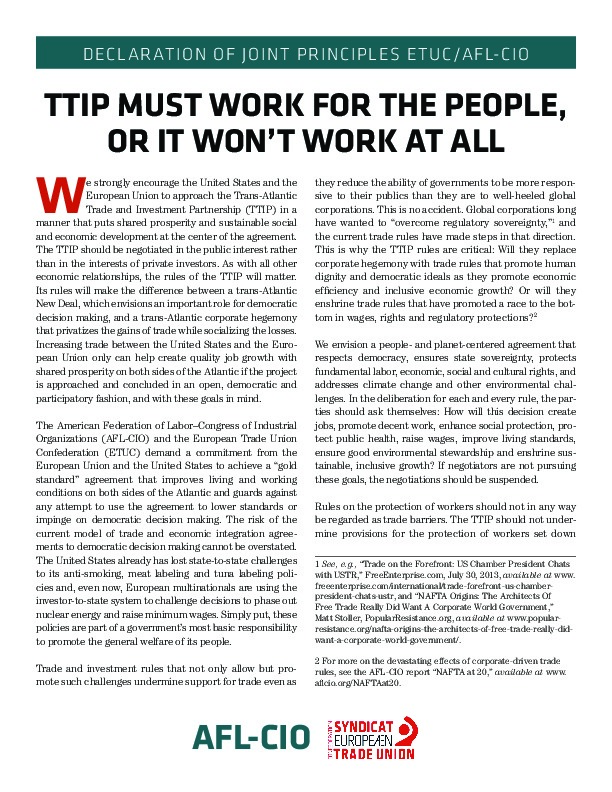We strongly encourage the United States and the European Union to approach the Trans-Atlantic Trade and Investment Partnership (TTIP) in a manner that puts shared prosperity and sustainable social and economic development at the center of the agreement. The TTIP should be negotiated in the public interest rather than in the interests of private investors. As with all other economic relationships, the rules of the TTIP will matter. Its rules will make the difference between a trans-Atlantic New Deal, which envisions an important role for democratic decision making, and a trans-Atlantic corporate hegemony that privatizes the gains of trade while socializing the losses. Increasing trade between the United States and the European Union only can help create quality job growth with shared prosperity on both sides of the Atlantic if the project is approached and concluded in an open, democratic and participatory fashion, and with these goals in mind.
The AFL-CIO and the European Trade Union Confederation (ETUC) demand a commitment from the European Union and the United States to achieve a “gold standard” agreement that improves living and working conditions on both sides of the Atlantic and guards against any attempt to use the agreement to lower standards or impinge on democratic decision making. The risk of the current model of trade and economic integration agreements to democratic decision making cannot be overstated. The United States already has lost state-to-state challenges to its anti-smoking, meat labeling and tuna labeling policies and, even now, European multinationals are using the investor-to-state system to challenge decisions to phase out nuclear energy and raise minimum wages. Simply put, these policies are part of a government’s most basic responsibility to promote the general welfare of its people.
Trade and investment rules that not only allow but promote such challenges undermine support for trade even as they reduce the ability of governments to be more responsive to their publics than they are to well-heeled global corporations. This is no accident. Global corporations long have wanted to “overcome regulatory sovereignty,” and the current trade rules have made steps in that direction. This is why the TTIP rules are critical: Will they replace corporate hegemony with trade rules that promote human dignity and democratic ideals as they promote economic efficiency and inclusive economic growth? Or will they enshrine trade rules that have promoted a race to the bottom in wages, rights and regulatory protections?
We envision a people- and planet-centered agreement that respects democracy, ensures state sovereignty, protects fundamental labor, economic, social and cultural rights, and addresses climate change and other environmental challenges. In the deliberation for each and every rule, the parties should ask themselves: How will this decision create jobs, promote decent work, enhance social protection, protect public health, raise wages, improve living standards, ensure good environmental stewardship and enshrine sustainable, inclusive growth? If negotiators are not pursuing these goals, the negotiations should be suspended.


